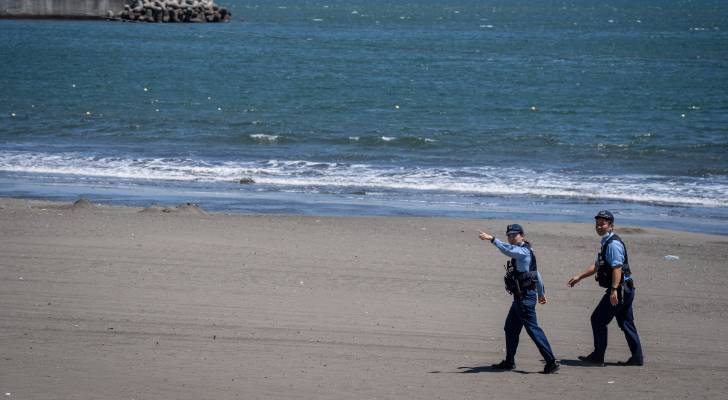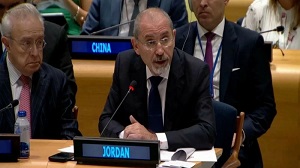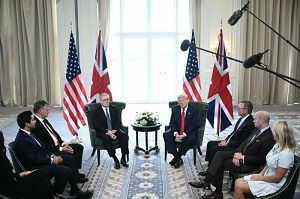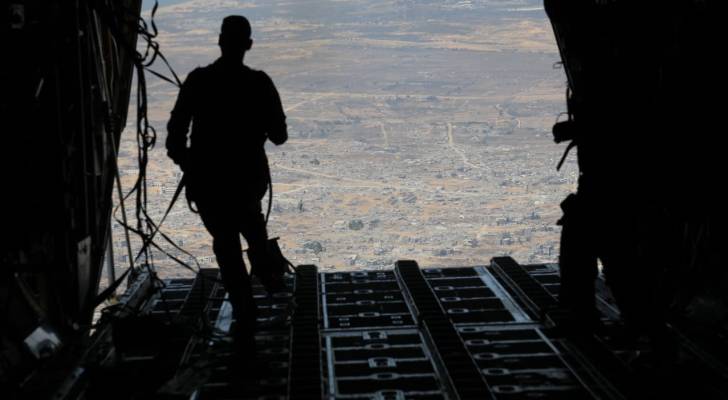From isolation to engagement: Syria’s new chapter begins
The Jordan Times
AMMAN — US President Donald Trump on Monday signed an executive order ending the American sanctions programme on Syria, aiming to reintegrate Damascus into the global financial system in line with Washington’s pledge to support Syria’s post-war reconstruction.
The move marks the most dramatic shift in US policy toward Syria since the ousting of former president Bashar Al Assad in December 8, 2024, and is widely seen as a sign of growing international recognition of the country’s interim leadership.
“The Syrian people deserve a new chance, and our actions today are meant to support those leading a new chapter in Damascus,” Trump said in a statement following the signing of the executive order.
“The order will remove sanctions on Syria while maintaining sanctions on the former president, Assad, his associates, human rights abusers, drug traffickers, and persons linked to chemical weapons activities, ISIS [English acronym for the Daesh terror group] and their affiliates, and Iranian proxies,” the White House press secretary Karoline Leavitt said on Monday.
The decision builds on earlier moves by the Trump administration, including limited relief for humanitarian aid announced in May, and follows similar actions by the United Kingdom. In April, Britain lifted sanctions on twelve Syrian entities including government ministries and media outlets, while removing sanctions on over twenty Syrian banks and oil companies in March, as reported by Reuters.
On July 5, British Foreign Secretary David Lammy visited Damascus to meet with Syria’s interim President Ahmad al-Sharaa and Foreign Minister Asaad al-Shaibani, marking the first high-level British visit in 14 years. Lammy pledged £94.5 million in aid aimed at humanitarian relief, education, and environmental cleanup.
Syria’s interim government has also signaled willingness to cooperate with the US to restore the 1974 disengagement agreement with Israel, which established a UN-monitored buffer zone along the Golan Heights. This announcement came following a phone call between Foreign Minister Asaad al-Shaibani and US Secretary of State Marco Rubio.
US envoy Thomas Barrack confirmed to The New York Times that indirect talks between Syria and Israel brokered by the US are now “meaningful,” with the goal of ending decades of conflict.
Analysts believe the easing of sanctions will help reintegrate Syria economically and politically into the region and facilitate the gradual return of Syrian refugees from neighboring countries like Jordan, Lebanon, Turkey, and Iraq, easing humanitarian burdens on those states.
Amer Sabaileh, a university professor and geopolitical analyst, told The Jordan Times that lifting sanctions marked a strategic turning point in how Syria is being perceived regionally.
“Without doubt, the issue of lifting sanctions is fundamental. It can be considered a green light to initiate full relations with the Syrian regime. We are not only talking about diplomatic ties, we’re talking about economic, social, and long-term strategic engagement, particularly in the context of geographic partnership. Major energy projects and initiatives could signal the beginning of a fundamental transformation in this relationship, and that’s an important point to focus on.” he said.
Sabaileh added that “the second dimension is that lifting sanctions serves as an invitation for all parties to move towards reconstruction in Syria. This could encourage Arab capital to return, support rebuilding and development, and ensure Syria remains a part of the Arab system. That will be especially important in the next phase, so that we don’t repeat past mistakes of allowing Syria to drift away from the Arab fold.”
“The third and arguably most vital point in the coming period is that sanctions relief , along with the emergence of a potential partner , could allow Syria to play a role in confronting the security threats currently present on its soil, which could have wider regional implications. These include terrorist groups, organised crime, drug trafficking, and arms smuggling. There may be a growing willingness to view the Syrian regime as a partner in tackling these threats in the future.”
Jordan, which hosts over a million Syrian refugees, welcomed the decision. “Jordan welcomes any step that supports Syria’s unity, sovereignty and stability,” said a spokesperson for the Ministry of Foreign Affairs in a statement carried by Petra News Agency. “The return of Syria to its regional role is essential for the security of the region and the voluntary return of refugees,” he added.
Latest News
-
 Huge quake off Russia sparks Pacific tsunami warnings
Huge quake off Russia sparks Pacific tsunami warnings
-
 Safadi says recognition of Palestinian State ‘urgent necessity’, prerequisite to achieving lasting peace
Safadi says recognition of Palestinian State ‘urgent necessity’, prerequisite to achieving lasting peace
-
 Trump says Gaza ceasefire 'possible' amid Starmer talks
Trump says Gaza ceasefire 'possible' amid Starmer talks
-
 Crown Prince attends ICT session within economic vision’s second phase workshops
Crown Prince attends ICT session within economic vision’s second phase workshops
-
 Jordan carries out two more Gaza aid airdrops, with UAE participation
Jordan carries out two more Gaza aid airdrops, with UAE participation